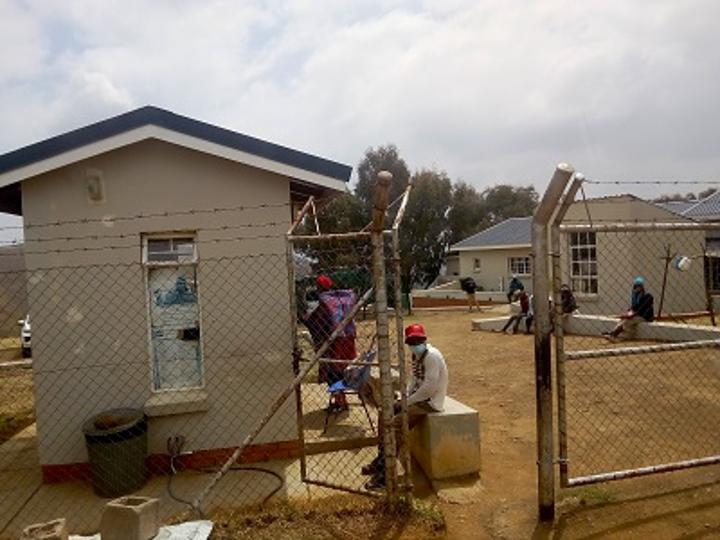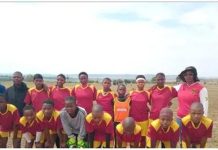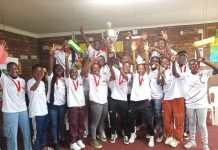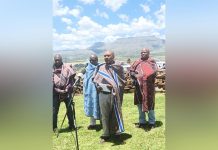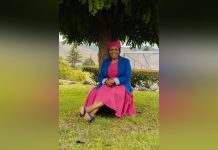Africa-Press – Lesotho. One is greeted with the deafening silence and sights of playing kids by the road works as they walk in the dusty road to Makhuonane Clinic but a silence which is often interrupted by the heavy road construction
machines making a multi-million Marakabei-Monontša road. I visited Makhunoane Health Centre on one scorching day, at the outskirts of Butha-Buthe district.
I arrived at around 11:00 am and found the clinic hall packed with many patients who had come for services. Like many new mothers, ‘Makenuoe Lefa is breastfeeding her child while sitting
patiently in the queue to see the nurse. She tells me that she had come for the family planning services. However, what is different unlike in the past is that she does not need to go from door
to door to see the nurse, thanks to the 2gether4SRHR programme. A few minutes in the queue she is called to the consultation room, I wait for her to return.
As she returns I could notice her beaming smile. We then resumed the interview wherein she narrates that she screened for breast cancer and tested HIV/AIDS.
The 27 years says her preferred contraception method is Sayana Press. This is a self-injection depo, which has been recently introduced in Lesotho. From
then onwards she is awaiting her child’s next check-up and her appointment. Established in 2018, 2gether4SRHR is a joint initiative by the United Nations (UN) regional
programme and it is implemented by its four agencies: Joined United Nations Programme on HIV/AIDS (UNAIDS), United Nations Population Fund (UNFP), World
Health Organisation (WHO) and United Nations Children’s Fund (UNICEF) which support the Government of Lesotho. According to the Ministry of Health, this programme has been rolled out to 10 districts
and it is always available in Christian Health Association of Lesotho (CHAL) health centres. This programme is envisaged to among others improve sexual and reproductive health
and rights of all people in particular the adolescent girls, young people and key populations. It also aspires to expedite the achievement of the UN 2030
targets on Sustainable Development Goals (SDGs) notably Goal No. 3 which is about the improvement of the health and well-being of all ages and also SDG No.
5 which aspires to achieve gender equality and empower women and girls. The UNFPA’s SRHR Coordinator, Blandina Motaung said the SRHR should be “comprehensive”. “Sexual
health is an integral part of overall health, well-being and quality of life,” she said. Similarly, the government has introduced Sexual Reproductive Maternal Child Adolescent
Health and Nutrition (SRMCAH+N) services. Richard Oinde is the Nursing Officer at Makhunoane said his clinic started integrating services as far back as 2016.
He hastened to highlight that before the integration, they did not see a high number of women who came to the clinic. Oinde said in the past they would have
one delivery per month but only in September, they had seven deliveries at the clinic, adding that they had moved from 20 percent to 50 percent delivery
rate. “When they come [to the clinic] they get services in one room,” he said. He further explains that a nurse assisting the patient will test him for TB, HIV/AIDS,
COVID-19 and pregnancy in the case of women and girls, a move which he says saves their patients time. Through the one-stop health services they render, he said when they capture pregnancy
at an early stage they put such a person on antenatal check-up services. Part of their work Oinde said is to sensitize patients on the prevention of sexually
transmitted infections (STIs) and the usage of contraceptives. He said there is an adolescent corner for the youth and adolescents but has since been disrupted owing to the COVID-19 outbreak.
Be that like it, he pointed that they still render such services and provide special dispensation to see the teenagers after hours and on weekends as they do not want to be seen by
elderly people who know them. Makhunoane Health Centre Nursing Officer however pointed out that the challenge they face is that generally adolescents and youth are reluctant to join the queues before
seeing the nurses as they are short-staffed. Lieketseng Senatla is the Midwife Nurse at the same clinic. She says she is only four months working at Makhunoane.
Asked to take me through what happens in the consultation room with the patient, she said they screen the patients and attempt to also establish the type of sexually
transmitted infections (STIs) they may have even if they had not come to be alleviated for such. Senatla showed that the response of pregnant women had been good as they are also
engaging during the health talks sessions which they conduct every morning before seeing the patients. Usually, before the start of their work every day, the nurses conduct health talks that
are geared towards educating the patients about many diseases, how they could be prevented and the prescribed cure for those already infected. These may
range from STIs, communicable diseases, chronic diseases as well as the COVID-19 which is a fatal infectious disease. The nurses have also been trained to screen for conditions related to domestic
violence to women during their routine check-ups as it does not only endanger the lives of women even that of their children. Convention on Elimination of All Forms of Discrimination Against Women (CEDAW) laid a
foundation on the enjoyment of sexual and reproductive rights. The International Conference on Population and Development (ICPD) which was held in Cairo, Egypt
back in 1994 was equally instrumental in addressing health rights and human reproduction. It enshrines women’s rights to reproductive and sexual health as
fundamental. The UNFPA is of the view that: “Good sexual and reproductive health is a state of complete physical, mental and social well-being in all matters relating to the
reproductive system. It implies that people are able to have a satisfying and safe sex life, the capability to reproduce, and the freedom to decide if, when,
and how to do so. “To maintain one’s sexual reproductive health, people need access to accurate information and safe, effective, affordable and acceptable contraception method
of their choice. And when they decide to have children, women must have access to services that can help them have a fit pregnancy, safe delivery and healthy
baby. ” For antenatal, WHO recommends at least not less than four hospital visits. ‘Majesina Matima goes for her routine check-ups at Lesotho Planned Parenthood Association
(LPPA) Clinic at Thakaneng, Maseru. The expecting mother has been going to the clinic since September. Not
only do they screen the conditions of her unborn child, but the mother also undergoes some screening processes and medical tests are conducted. She says they conduct urine tests, breast cancer, the position of the baby, height,
body weight and they also run results to check if there are any STIs, health education, self-care and counselling. The 31 years old said she was advised to go for the family planning services.
Asked to give her reflections about the type of services she receives in one place by one person, she says: “These services are time-saving and save her from going
back and forth. ” It is believed that during this visit, Matima will be told of the estimated date of delivery. Also, ‘Mathato Lekhema is a new mother who goes to Qoaling Centre Clinic for family planning
services. Her preferred choice of family planning method is an injection, she said. Asked about other services she receives in the consultation room, she said they range
from counselling, HIV testing, body weight, high blood pressure and also the medication. These services she says she receives in one go by a single nurse.
“They are essential services that we need for us to know our status and that of our
children,” she says. WHO says: “Preventing problems for mothers and babies depends on an operational continuum of care with accessible; high-quality care before and during pregnancy, childbirth and postnatal period. ” The 2gether4SRHR programme is slowly inspiring harmonized health professionals-patients relations.
For More News And Analysis About Lesotho Follow Africa-Press

